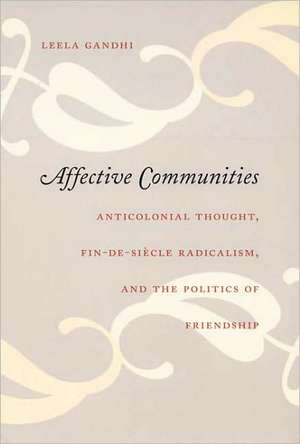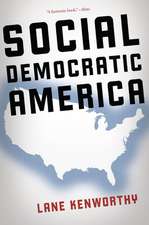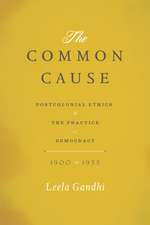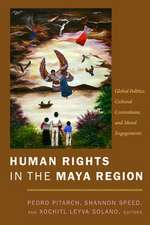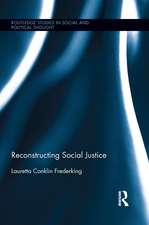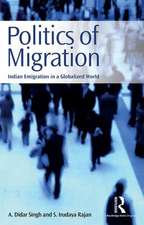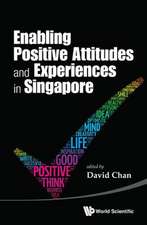Affective Communities – Anticolonial Thought, Fin–de–Siecle Radicalism, and the Politics of Friendship: Politics, History, and Culture
Autor Leela Gandhien Limba Engleză Paperback – 10 ian 2006
Din seria Politics, History, and Culture
-
 Preț: 240.73 lei
Preț: 240.73 lei -
 Preț: 210.26 lei
Preț: 210.26 lei -
 Preț: 247.63 lei
Preț: 247.63 lei -
 Preț: 265.79 lei
Preț: 265.79 lei -
 Preț: 238.39 lei
Preț: 238.39 lei -
 Preț: 261.56 lei
Preț: 261.56 lei -
 Preț: 263.47 lei
Preț: 263.47 lei -
 Preț: 306.60 lei
Preț: 306.60 lei -
 Preț: 264.26 lei
Preț: 264.26 lei -
 Preț: 305.61 lei
Preț: 305.61 lei -
 Preț: 262.70 lei
Preț: 262.70 lei -
 Preț: 303.33 lei
Preț: 303.33 lei -
 Preț: 262.52 lei
Preț: 262.52 lei -
 Preț: 212.48 lei
Preț: 212.48 lei -
 Preț: 261.56 lei
Preț: 261.56 lei -
 Preț: 262.32 lei
Preț: 262.32 lei -
 Preț: 230.02 lei
Preț: 230.02 lei -
 Preț: 237.47 lei
Preț: 237.47 lei -
 Preț: 335.88 lei
Preț: 335.88 lei -
 Preț: 300.83 lei
Preț: 300.83 lei -
 Preț: 238.39 lei
Preț: 238.39 lei -
 Preț: 238.01 lei
Preț: 238.01 lei -
 Preț: 262.14 lei
Preț: 262.14 lei -
 Preț: 312.74 lei
Preț: 312.74 lei -
 Preț: 260.41 lei
Preț: 260.41 lei -
 Preț: 310.83 lei
Preț: 310.83 lei -
 Preț: 300.24 lei
Preț: 300.24 lei -
 Preț: 335.12 lei
Preț: 335.12 lei -
 Preț: 234.61 lei
Preț: 234.61 lei -
 Preț: 223.65 lei
Preț: 223.65 lei -
 Preț: 256.06 lei
Preț: 256.06 lei
Preț: 261.56 lei
Nou
Puncte Express: 392
Preț estimativ în valută:
50.06€ • 52.07$ • 41.32£
50.06€ • 52.07$ • 41.32£
Carte tipărită la comandă
Livrare economică 14-28 aprilie
Preluare comenzi: 021 569.72.76
Specificații
ISBN-13: 9780822337157
ISBN-10: 0822337150
Pagini: 264
Dimensiuni: 180 x 233 x 16 mm
Greutate: 0.39 kg
Editura: MD – Duke University Press
Seria Politics, History, and Culture
Locul publicării:United States
ISBN-10: 0822337150
Pagini: 264
Dimensiuni: 180 x 233 x 16 mm
Greutate: 0.39 kg
Editura: MD – Duke University Press
Seria Politics, History, and Culture
Locul publicării:United States
Recenzii
"Affective Communities is outstanding. It stretches postcolonial theory well beyond its usual boundaries. Leela Gandhi successfully documents the anti-imperial affiliations and politics of certain marginalized subcultures in late-nineteenth-century Britain and Europe, and she shows what Indian nationalists owed to these traditions. Dipesh Chakrabarty, author of Provincializing Europe: Postcolonial Thought and Historical Difference
"A very original and thought-provoking book, Affective Communities offers an outstanding contribution to postcolonial and queer studies. Leela Gandhi provides detailed, brilliant discussions of particular figures such as Edward Carpenter, Henry Salt, and M. K. Gandhi and the ways in which they interwove their various radical counter-cultural interests into larger political strategies of anticapitalist utopianism. Robert J. C. Young, author of Postcolonialism
"Affective Communities is outstanding. It stretches postcolonial theory well beyond its usual boundaries. Leela Gandhi successfully documents the anti-imperial affiliations and politics of certain marginalized subcultures in late-nineteenth-century Britain and Europe, and she shows what Indian nationalists owed to these traditions." Dipesh Chakrabarty, author of Provincializing Europe: Postcolonial Thought and Historical Difference "A very original and thought-provoking book, Affective Communities offers an outstanding contribution to postcolonial and queer studies. Leela Gandhi provides detailed, brilliant discussions of particular figures such as Edward Carpenter, Henry Salt, and M. K. Gandhi and the ways in which they interwove their various radical counter-cultural interests into larger political strategies of anticapitalist utopianism." Robert J. C. Young, author of Postcolonialism
"A very original and thought-provoking book, Affective Communities offers an outstanding contribution to postcolonial and queer studies. Leela Gandhi provides detailed, brilliant discussions of particular figures such as Edward Carpenter, Henry Salt, and M. K. Gandhi and the ways in which they interwove their various radical counter-cultural interests into larger political strategies of anticapitalist utopianism. Robert J. C. Young, author of Postcolonialism
"Affective Communities is outstanding. It stretches postcolonial theory well beyond its usual boundaries. Leela Gandhi successfully documents the anti-imperial affiliations and politics of certain marginalized subcultures in late-nineteenth-century Britain and Europe, and she shows what Indian nationalists owed to these traditions." Dipesh Chakrabarty, author of Provincializing Europe: Postcolonial Thought and Historical Difference "A very original and thought-provoking book, Affective Communities offers an outstanding contribution to postcolonial and queer studies. Leela Gandhi provides detailed, brilliant discussions of particular figures such as Edward Carpenter, Henry Salt, and M. K. Gandhi and the ways in which they interwove their various radical counter-cultural interests into larger political strategies of anticapitalist utopianism." Robert J. C. Young, author of Postcolonialism
Notă biografică
Textul de pe ultima copertă
"A very original and thought-provoking book, "Affective Communities" offers an outstanding contribution to postcolonial and queer studies. Leela Gandhi provides detailed, brilliant discussions of particular figures such as Edward Carpenter, Henry Salt, and M. K. Gandhi and the ways in which they interwove their various radical counter-cultural interests into larger political strategies of anticapitalist utopianism."--Robert J. C. Young, author of "Postcolonialism"
Cuprins
Descriere
Illuminates the history of western anti-imperialism through the stories of a number of specific friendships that flourished between South Asians and Europeans between 1878 and 1914.
